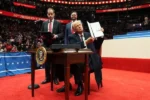Have you ever wondered what happens to important documents when a president leaves office? Recently, a judge made a big decision about former President Donald Trump and some mysterious papers that he might have mishandled. This story is all about whether Trump really flushed some important records down the toilet! A journalist named Jason Leopold asked the FBI for information about these documents, and now the judge says it’s time for the public to know. Let’s dive into the fascinating details about this unusual case and what it means for the government and its secrets!
| Date | Event | Judge | Key Points | Outcome |
|---|---|---|---|---|
| February 10, 2025 | Federal judge orders release of documents | U.S. District Judge Beryl A. Howell | – Judge ordered FBI to release documents related to Trump’s alleged flushing of records. – FOIA request was made by journalist Jason Leopold. – Judge referenced SCOTUS ruling granting presidents immunity from prosecution for official acts. |
Documents to be released to the public regarding Trump’s handling of presidential records. |
| February 2022 | Allegation of flushing records | – Allegations emerged that Trump flushed presidential records down the toilet during his presidency. – Archivist reported that Trump retained classified documents at Mar-a-Lago post-2020 election. |
FBI denied initial requests for records. | |
| FBI’s Justification | – FBI cited Exemption 7(A) to withhold records, claiming it could interfere with enforcement proceedings. – Glomar response used to avoid confirming or denying existence of records. |
Howell ruled FBI’s justifications were no longer valid. | ||
| Supreme Court’s Role | – Judge critiqued Supreme Court’s decision on presidential immunity. – Stated immunity protects the president but does not prevent public disclosure of actions. |
Public will learn more about government’s actions. |
Understanding the Disclosure Order
In a recent ruling, a federal judge ordered the FBI to release documents related to Donald Trump’s handling of presidential records. This decision came after a journalist filed a Freedom of Information Act (FOIA) request, seeking clarity on whether Trump had flushed important documents down the toilet. The judge emphasized that the public has a right to know about government actions, especially when it involves high-ranking officials like a former president.
The judge’s ruling is significant because it highlights the importance of transparency in government. With the ongoing discussion about presidential accountability, this disclosure could provide valuable insights into how Trump managed classified information during his term. The public’s right to access this information is a fundamental principle of democracy, ensuring that citizens can hold their leaders accountable.
The Impact of Supreme Court Rulings on Transparency
The U.S. Supreme Court recently ruled that a sitting president has immunity from prosecution for actions taken while in office. This ruling influenced the judge’s decision to allow the release of records related to Trump’s actions. While this immunity protects presidents from legal consequences, it does not shield them from public scrutiny. The judge noted that understanding these actions is essential for the American public.
This situation raises important questions about the balance between presidential power and public accountability. Even though the court’s ruling provides protection for presidents, it also emphasizes the need for transparency in government affairs. Citizens deserve to know how their leaders handle sensitive information, especially in cases involving potential misconduct.
The Allegations Against Trump and Their Significance
Allegations that Donald Trump may have flushed presidential records down the toilet have sparked widespread interest and concern. Such actions, if true, would indicate a serious disregard for the preservation of important government documents. The investigation into these claims is crucial, as it reflects on the integrity of presidential conduct and the importance of maintaining accurate records of governmental actions.
The significance of these allegations extends beyond just one individual. They raise broader issues about how government officials manage classified information and the processes in place to protect these records. Understanding the implications of such actions can help inform future policies regarding document handling and accountability in the highest levels of government.
The Importance of Transparency in Government Actions
Transparency in government actions is crucial for maintaining public trust and accountability. When officials handle sensitive information, the public deserves to know how that information is managed, especially regarding potential misconduct. The recent ruling by Judge Howell underscores the necessity for open access to records that could shed light on whether presidential documents were improperly discarded. This insistence on transparency aligns with the Freedom of Information Act’s core principle that citizens have a right to understand governmental operations.
Moreover, transparency serves as a safeguard against potential abuses of power. As citizens, we rely on the government to act in our best interests, but without insight into its operations, we are left in the dark. In this case, the judge emphasized the public’s right to judge the actions of its officials, which is essential for a healthy democracy. By compelling the release of these records, the court is reinforcing the idea that government officials are not above scrutiny, which is vital for fostering civic engagement.
The Role of the Supreme Court in Presidential Accountability
The Supreme Court plays a pivotal role in shaping the landscape of presidential accountability, as demonstrated by its ruling that grants sitting presidents immunity from prosecution for official acts. This decision, while intended to protect presidential duties, raises concerns about the potential for abuse of power without sufficient checks. Judge Howell’s ruling highlights how this immunity does not absolve presidents from public scrutiny regarding their actions, especially in cases of alleged misconduct involving sensitive documents.
Furthermore, the Supreme Court’s interpretation of presidential immunity must be balanced with the need for transparency and accountability. While it protects presidents from legal repercussions for their official decisions, it should not shield them from the consequences of unethical actions. The judge’s remarks about the historical context of accountability serve as a reminder that no one is above the law, and that the public must remain informed about government operations to ensure that officials act within ethical boundaries.
Implications of the Judge’s Ruling for Future FOIA Requests
Judge Howell’s ruling sets a significant precedent for how FOIA requests involving high-profile figures may be handled in the future. By emphasizing that the government cannot continue to withhold information under the guise of protecting ongoing investigations when no such investigations exist, the ruling opens the door for greater access to previously withheld documents. This could empower journalists and the public to seek more information on government actions, fostering a more informed electorate.
Additionally, this ruling signals to federal agencies that they must carefully evaluate their reasons for withholding information. The decision highlights that invoking exemptions to deny FOIA requests must be substantiated with clear and relevant justifications. As a result, agencies may need to reassess their approaches to transparency, leading to a potential shift in how they handle similar requests in the future and encouraging a culture of openness in government.
Public Reaction and Media Coverage of Document Disclosure
The public reaction to Judge Howell’s ruling has been mixed, with some expressing relief at the prospect of increased transparency regarding presidential conduct. Many citizens believe that understanding the actions of their leaders is essential for democracy, especially in light of the allegations surrounding former President Trump. The media has responded enthusiastically, recognizing the potential of the released documents to inform ongoing discussions about presidential accountability and the integrity of government operations.
Media coverage surrounding this issue has also emphasized the importance of investigative journalism in uncovering truths about government actions. Journalists like Jason Leopold, who initiated the FOIA request, play a crucial role in holding officials accountable by providing the public with access to information that may otherwise remain hidden. This case serves as a reminder of the vital interplay between the press, the judiciary, and the public in maintaining a transparent and accountable government.
Frequently Asked Questions
What are presidential records and why are they important?
**Presidential records** are official documents created by the president during their time in office. They are important because they help the public understand government actions and decisions.
What does it mean when someone says Trump flushed documents down the toilet?
It means that there are claims that former President Trump **destroyed important papers** by flushing them away. This raises questions about whether he followed the rules about keeping important government records.
Why did the judge order the FBI to release certain documents?
The judge ordered the FBI to release documents because Trump is no longer at risk of being punished for how he handled records. The public has a right to know what happened with those documents.
What is the Freedom of Information Act (FOIA)?
**FOIA** is a law that allows people to request access to government documents. It helps ensure that the public can learn about what the government is doing and hold officials accountable.
What does it mean when a request is denied under a Glomar response?
A **Glomar response** means the government refuses to confirm or deny whether certain documents exist. This is often used when discussing sensitive investigations.
How did Trump’s election victory affect the investigation into his handling of documents?
After Trump won the election, the **Supreme Court** ruled that he had immunity from being prosecuted for actions taken as president. This affected how documents related to his time in office were handled.
What is the significance of the court’s ruling regarding presidential immunity?
The ruling shows that while a president may not face criminal charges for their actions, the public still has a right to know about **government activities** and any potential misconduct.
Summary
The content discusses a federal judge’s ruling ordering the FBI to release documents related to allegations that former President Donald Trump mishandled presidential records, including claims he flushed some down the toilet. Following his 2024 election victory and the Supreme Court’s ruling granting him immunity from prosecution, the judge concluded that the FBI’s justifications for withholding the records were no longer valid. The ruling emphasizes the public’s right to know about government actions, stating that while Trump may be immune from criminal charges, transparency regarding his actions remains crucial.







